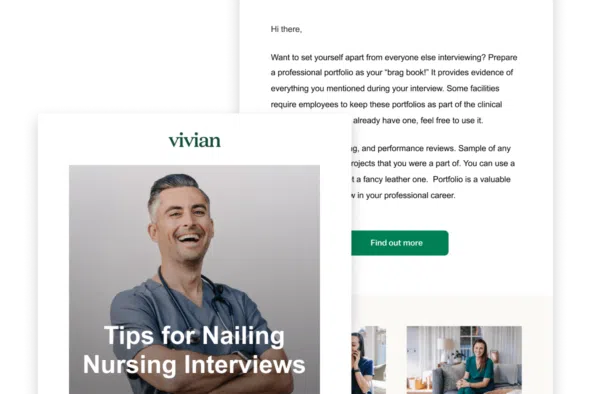Since the start of the COVID-19 pandemic, the rate of nurse burnout has grown drastically. Vivian’s recent workforce survey found 76.4% of healthcare professionals said that morale in their hospital had gotten worse since this time last year. Many organizations don’t have the capacity to provide support for these employees – especially during the pandemic. And unfortunately, a whopping 79.4% said that their employers were not doing enough to support their mental health.
So what can we do for ourselves and our colleagues to help?
6 Tips to Support Your Nurse Colleagues
Support groups for nurses and healthcare workers may not be available to everyone. But there are ways you can support the nurses around you.
Start a peer support group
Your hospital or organization might not have a peer support group – but that doesn’t mean you can’t start one. There are tons of resources out there to walk you through starting this type of program at your organization.
It can be widespread throughout the entire organization – where you meet regularly and have a multitude of resources for all the staff involved. Or, it could be a smaller scale – like a Facebook group where staff can post about their thoughts and feelings. Find out what works for you and your team.
And don’t be afraid – support groups are one of the most effective tools to help and empower one another.
Check in with each other
If a support group feels too formal, you can make it even easier by just touching base with your colleagues. It is a simple but effective way to show your team that you care about them.
Ask them genuine questions about how they’re doing. It’ll show them that you care about how they’re feeling. It’ll also give them a chance to share how they’re being affected by the current climate. You may have to be the first to open up and tell them how you’re actually doing, and that may help them feel comfortable opening up to share what they’re dealing with. So tell them how you’re doing and be honest. They’ll feel more comfortable being vulnerable with you if you’re vulnerable first.
If someone tells you they’re struggling – be prepared. Have a list of resources on hand like a support group or crisis hotline and prepare yourself for what you will say. Don’t just say, “everything will be okay,” because that’s not helpful. Tell them you understand, have been there, and appreciate them sharing with you. They don’t need you to fix their feelings at that moment; just hear them. Also, please remember that if someone confides something serious that concerns you (such as suicidal thoughts or self-harm) please recommend them to see a professional.
Prioritize wellness
Nurses are getting burnt out because of the long and demanding hours and the trauma of working in healthcare. Many are working overtime instead of taking care of themselves, especially during the COVID-19 pandemic. But, it’s never been more important for nurses to take care of themselves. Nurses are leaving the profession in droves, and COVID has only worsened it. Last year, Vivian reported that 40% of healthcare professionals were considering leaving their profession. This year, 67% of respondents indicated they plan to leave healthcare, and 11.3% of respondents said they would leave within the next 6 months.
So what can you personally do? You can be a role model to your colleagues by taking care of yourself.
- Don’t take over time if you’re feeling tired.
- Call out when you’re sick – no matter what.
- Share how you take care of yourself – and encourage other nurses to do the same.
- Start a group that promotes self-care, like a meditation or yoga group. Lead these sessions yourself in your unit with your coworkers.
Show them that you take care of yourself first, and so should they.
Take time to laugh with your team
In the face of the COVID-19 tragedy, taking time to laugh might feel inappropriate.
It’s important to surround yourself with the beauty of the world. Take a nature walk together, soak up the sun with an outdoor lunch, and literally stop to smell the roses.
And don’t forget to find space to laugh while at work. Humor is an incredibly effective coping mechanism during times of crisis, and it can help you stay grounded when everything seems up in the air.
Outside of work, watch a funny movie, scroll through TikTok (there are some hilarious creators there), and spend time with your funniest friends. Even better—BE the funny friend!
Practice gratitude
Regularly expressing gratitude helps combat negative thoughts, and it can also help you see the good during times of stress.
- Tell your coworkers how grateful you are to work with them
- How grateful you are to know them.
- And how grateful their patients are for their care.
- Write down three things you’re grateful for every day.
- Write a list of 100 things you’re thankful for and carry it with you, refer to it when you’re feeling low!
Encourage the nurses around you to express gratitude and see what they have in their lives to be grateful for.
Pay attention and be supportive
There’s more to communicating than just words. Notice how your coworkers respond when you ask how they are – both verbally and nonverbally. They might say they’re fine – but shifting eyes, fidgeting fingers, and a shaking leg says otherwise. If you notice those nonverbal cues, let them know you’re there for them. Take time to notice if any of the nurses around you seem down – then make it a priority to reach out.
If someone says they need help, offer it. Do what you can. And remember that YOUR nonverbal cues can show nurses that you care about them.
Ready to make a difference?
Now that you have some concrete ideas, give them a try next time you’re at work. This can make a huge difference in your colleagues’ lives and your own life!
A happier unit is a more productive unit. And it generally reports better patient outcomes as well. So, are you ready to make a difference for yourself, your coworkers, and your patients? Do you feel like you work in a unit that fosters these ideals? If not, check out Vivian’s jobs to find your new, more supportive job!
View our entire 2022 State of Healthcare Workforce Survey and its results to learn more.




